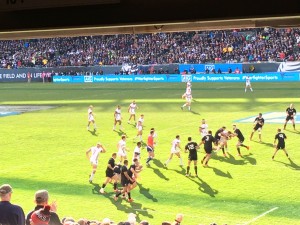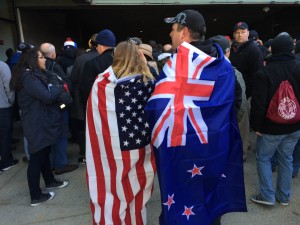As shown in the above photos, the USA Eagles national rugby union team played the New Zealand All Blacks this past Saturday, November 1st, 2014 for an exhibition game at Chicago’s Soldier Field. The historic match was sold out, filling the 61,500-seat stadium, drawing fans from around the area and the globe to see the upstart Americans take on the mighty All Blacks, widely considered not only the best rugby team in the world, but the best sports team in the world, considering their winning record. Here’s a piece from the TV news program 60 Minutes that breaks down the All Blacks’ legacy and significance for an uninitiated North American audience. Saturday’s event marked the All Blacks’ first-ever appearance in a match in the United States.
There’s something elemental – dare I say, “pure” – about a sport like rugby (aka “Rugby football”). In this sport, which, along with soccer, “descended from the winter ‘folk-games’ which were a deeply-rooted tradition in pre-industrial Britain” (Dunning and Sheard 2005: 1), there are two teams of players, a ball on a field, time on the clock, and a few referees. No sticks, no pads, and none of the start-and-stop minutiae of more ancient games like cricket, or more recent ones such as baseball or American football. Of course there are finer points that add to the complexity of the game. But within rugby’s more elemental aspects of strength, stamina, and teamwork lies its great potential for both individual expression and synergy. As well as its worldwide appeal.
In a nutshell, the sport of rugby is played in two 40-minute halves, separated by a very brief halftime, wherein two teams (or “sides”) of fifteen players each battle to advance an egg-shaped ball into the opponent’s end-zone. A “try” in rugby is the equivalent of a touchdown in American football, but in the case of the former is worth five points as opposed to six. Another difference between scoring in rugby and American football is that, in rugby, the ball must be literally touched down onto the turf in the end-zone to count. A successful conversion after a try – a kicked ball through the goalposts – is worth two points, as opposed to the 1-point extra point in American football. Otherwise points in rugby are scored – in this regard identical to American football – by kicking the ball through the opponent’s goalposts for three points. Differing from American football, however, is the rule in which a felled ball carrier in rugby does not signify a stop of the clock or a “down” but rather that the tackled player must pass the ball onto a teammate on his or her feet to continue the advancement down the field. And, oddly enough to we Americans, while said advancement is achieved by running the ball forward, a pass to a teammate may only be executed by tossing the ball either backwards or to the side. Mistakenly passing the ball forwards would result in a penalty. Make sense? Here’s a quick recap of Saturday’s USA-New Zealand match for an example of what this all looks like at the highest level of play.
In the nations where rugby has been historically popular and remains so to this day – namely, New Zealand, Australia, England, Scotland, Wales, South Africa, France, and Western Samoa (Dunning and Sheard: 256) – oftentimes the role of the sport takes on great geopolitical significance. In no case was this more true than the Rugby World Cup of 1995, when the New Zealand All Blacks faced the Springboks of South Africa in the final. Set against the backdrop of the recent end of South African apartheid, the introduction of universal suffrage in that nation, and the election of formerly jailed political dissident Nelson Mandela to its office of President of the Republic, the Springbok’s dream season is expertly captured in the book Invictus by John Carlin, as well as the feature film adaptation of the same (directed by Clint Eastwood and starring Morgan Freeman and Matt Damon). Quoting the Cape Town newspaper the Argus, Carlin sums up the national significance of the event: “‘The Rugby World Cup has led to a spectacular upsurge of national reconciliation among all races in South Africa, researchers and social scientists reported this week'” (2009: 203). With the backing and encouragement of their new, charismatic, and peace-loving leader, millions of South Africans cheered the hitherto divisive Afrikaner-majority “Boks” on to a 15 to 12 victory over the seemingly unbeatable All Blacks. Previously a symbol of the Boer-ruled apartheid regime, Mandela paid considerable attention to rugby as it related to the Afrikaner psyche as well as its potential, exemplified in the slogan “One Team, One Country.” As Carlin details, through his support Mandela convinced his constituents to do the same and come together as a nation, regardless of race, color, ethnicity, language, or politics.
While the USA Eagles were certainly also underdogs in their match against the New Zealanders, rugby perhaps has a ways to go before it attracts the most well-suited athletes of the American populace away from other sports. Even though the Eagles only scored six points on their home turf against New Zealand’s stunningly coordinated 74, the sold-out match, however, is perhaps a foreshadowing of a growing popularity of the sport on American soil. As the game grows here, as will fans’ expectations of the Eagles’ performance on the international stage. And, in that case, they had better figure out a way to first get past the All Blacks’ haka, the formidable, awesomely intense traditional Maori war dance performed before each match they play begins. As the chant goes, “Ka mate! Ka mate! Ka ora!: ’Tis death! ‘Tis death! ’Tis life!” (Armstrong 1964: 139). 
Sources:
Armstrong, Alan (1964). Maori Games and Hakas: Instructions, Words and Actions. Wellington: A.H. & A.W. Reed.
Carlin, John (2009). Invictus: Nelson Mandela and the Game That Made a Nation. London: Atlantic Books.
Dunning, Eric and Kenneth Sheard (2005). Barbarians, Gentlemen, and Players: A Sociological Study of the Development of Rugby Football. Oxford: Routledge.




